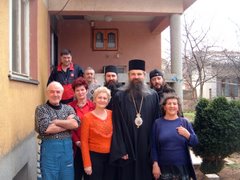NATO Reopens Bases In Northern Provinces of Serbia
Balkan reality intrudes on NATO's grand plans
November 28, 2006 8:24 AM
RIGA, Latvia-NATO leaders are preoccupied with the deteriorating situation in Afghanistan and an effort to transform their alliance into a global security organization. But it's still dogged by problems closer to home: the possibility of renewed unrest in the Balkans if Kosovo gains independence as expected next year.
Speaking before a summit in the Latvian capital, Secretary General Jaap de Hoop Scheffer made it clear that NATO could not afford to neglect Kosovo.
"I can assure anybody who wants to spoil things there that ... KFOR is there to prevent anything from happening," he said, referring to the NATO force that has been keeping the peace between majority ethnic Albanians and minority Serbs in the province since 1999.
On Tuesday, NATO's Supreme Allied Commander, Gen. James L. Jones, held up the flexibility of alliance forces in Kosovo as an example of how they need to be used in Afghanistan, where a number of contributing nations have placed restrictions, or caveats, on their use in the Taliban's southern strongholds.
"We have 16,000 NATO troops (in Kosovo), and there are virtually no restrictions no national caveats," he told a security conference.
"Kosovo was (also) overwhelmingly restricted by caveats, but we learned a lesson," Jones said, referring to deadly rioting by ethnic Albanians that shook the region in March 2004.
The need to keep a large NATO garrison in Kosovo has caused problems for Jones, who has been calling for the alliance to come up with 2,500 additional soldiers to beef up its 32,800 troops in Afghanistan.
Kosovo is the final unresolved problem stemming from the series of wars that followed the breakup of Yugoslavia in 1991, which claimed the lives of about 200,000 people.
The province has been an international protectorate since NATO forced the Serbian army to cede control following a short war seven years ago. The international community is now awaiting a proposal by U.N. special envoy Martti Ahtisaari on its future status.
Belgrade, which insists that the province must not gain independence, has already indicated it will not accept any proposal that severs its links to the province. But ethnic Albanians, who comprise 90 percent of Kosovo's 2 million population, are equally adamant that they will only accept full independence.
Complicating matters further for NATO is the likelihood that any precedent created by the breakup of an existing European state will almost certainly be exploited to justify secessionist moves elsewhere. This is particularly true of Georgia, whose breakaway regions of South Ossetia and Abkhazia are also intent on independence.
After a series of delays, Ahtisaari's ruling on Kosovo's status has been delayed until after Serbian elections in January. Expecting trouble, NATO recently dispatched reinforcements to the Serb-inhabited north of the province and reopened two army bases there.
"There is a real potential for renewed violence in Kosovo," said Tim Judah, a Balkan expert. "If there is a delay or if the resolution is unclear, Albanian hard-liners will start to lose patience and bust out their Kalashnikovs."
Judah predicted an "intermediate solution" for the province. "This in effect is that Serbia loses Kosovo, but Kosovo loses the north, a sort of Cyprus in the middle of Europe," he said.
Paradoxically, although NATO bombed Serbia in 1999, and although Belgrade remains outside NATO's Partnership for Peace program to groom potential candidates for membership, it is now preparing to welcome the first Serbian contingent in Afghanistan.
In Belgrade, a defense ministry spokesman said that 20 army doctors will join a Norwegian field hospital in the town of Mazar-e-Sharif in northern Afghanistan.
Serbia, along with Bosnia-Herzegovina and tiny Montenegro, expects to be inducted into the PFP next year. Meanwhile, two other ex-Yugoslav states, Croatia and Macedonia, are hoping to join NATO in 2008, along with Albania.
"By 2008, I hope we will have less NATO in the Balkans, but more Balkans in NATO," de Hoop Scheffer said Tuesday.

















